

Women in Northern Ghana are an important part of the agricultural labour force, making a huge contribution to their local communities. But they do not receive the rights and recognition they deserve, and struggle to access support services which would enable them to grow and sell more produce.
If you don’t own land – you aren’t able to control how much and what you grow.
If you can’t access quality seeds, water and tools – you are going to grow less food.
If you can’t join the local cooperative because of social barriers restricting your access – you can’t access loans and markets to expand your agricultural opportunities.
With male relatives typically owning land, and having access to market opportunities to save, borrow small loans to invest in their land and increase crop production – these social and economic barriers prevent women from increasing their household income.
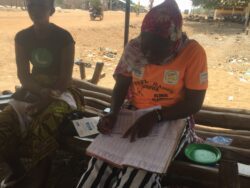
A secretary for her local VSLA recording contributions from the group
Led by our in-country partner, NORSAAC, our two year vocational training project started last year to promote economic independence for women and young people by setting up village savings and loans associations (VSLAs).
VSLAs are groups of agricultural practising women, set up by women within a community. Coming together the groups share knowledge of skills and local markets, how to increase crop yields and enable ways to stimulate savings. Often members of the group will all contribute to a group saving scheme. This creates an opportunity for women to access micro loans to invest in their land through buying new seeds or fertilizer. This is life changing for women who don’t otherwise have the means or access to set up a bank account.
Based in the Karaga and Gushegu Districts of across two 12 month cycles, 80 young people who are unemployed and living in vulnerable situations, will learn carpentry, tailoring and welding vocational skills. Literacy and business skills classes will equip them so they can use their vocational skills and toolkit to establish their enterprise, and earn an income for themselves and their families.
A proportion of the trainees, will be trained to become village agents who will then set up VSLAs within their community to support the sharing of growing tips, advice on how to access markets and expand activities.
The VSLA groups will reach 1200 community members (70% of which are women) helping to start conversations and reduce gender stereotyping by creating opportunities for women to gain access to markets, conversations and increase their income whilst strengthening in the value chain which will benefit everyone in the community.
When women are economically empowered the whole community benefits.
This project will be contributing to the achievement of the following Sustainable Development Goals:

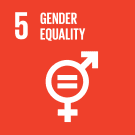
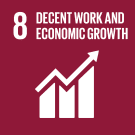
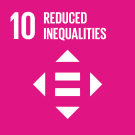
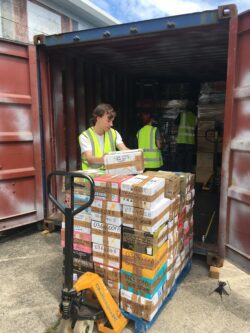
Volunteers Oleg and Alfiia support workshop manager Stuart to load the container with haberdashery kits to support graduate tailors to set up their new enterprise
To support this project with NORSAAC and our four other project partnerships, over 4000 donated and refurbished tools began their journey to Ghana on 9 June.
As well as 116 electric and hand sewing machines – 25 bicycle were also sent meaning trainees aren’t burdened with transport costs to reach their training centre.
Don’t miss our monthly project updates by signing up to receive emails straight into your inbox.